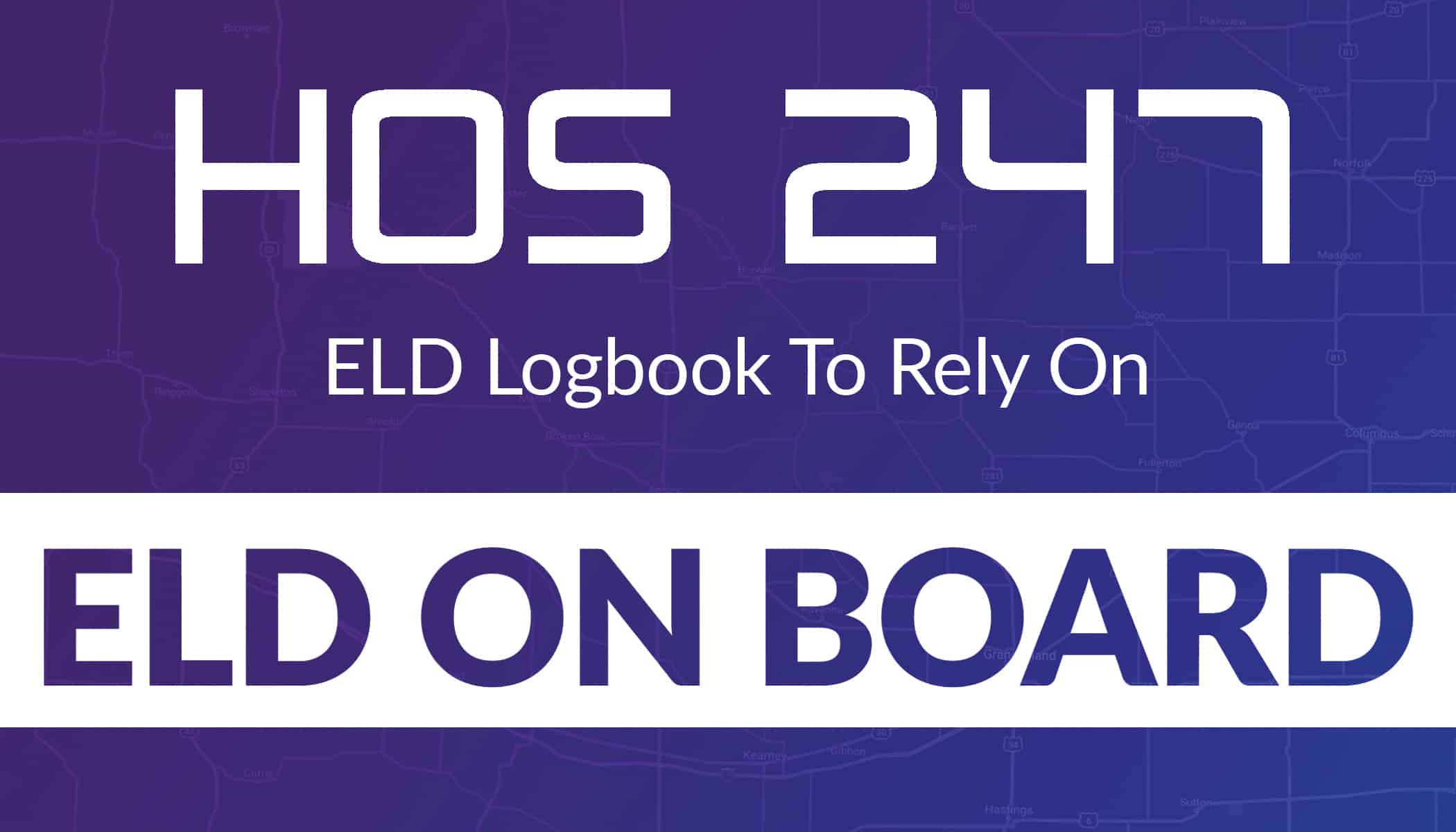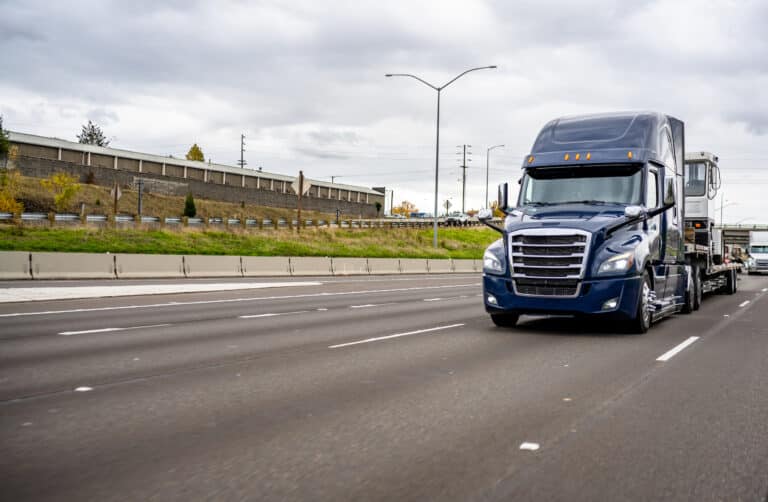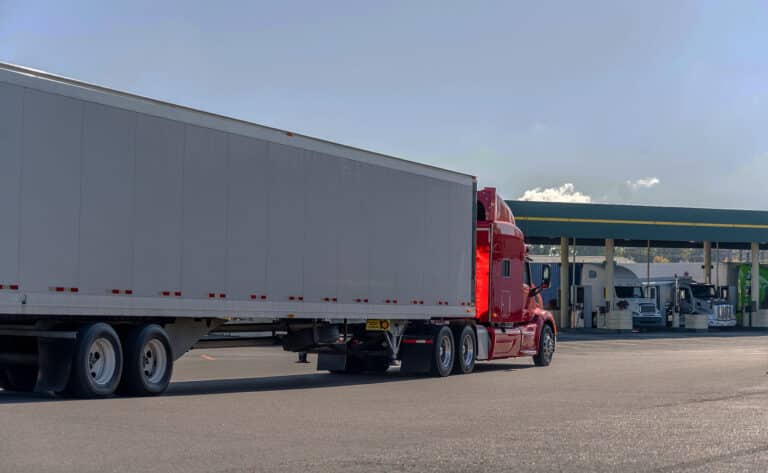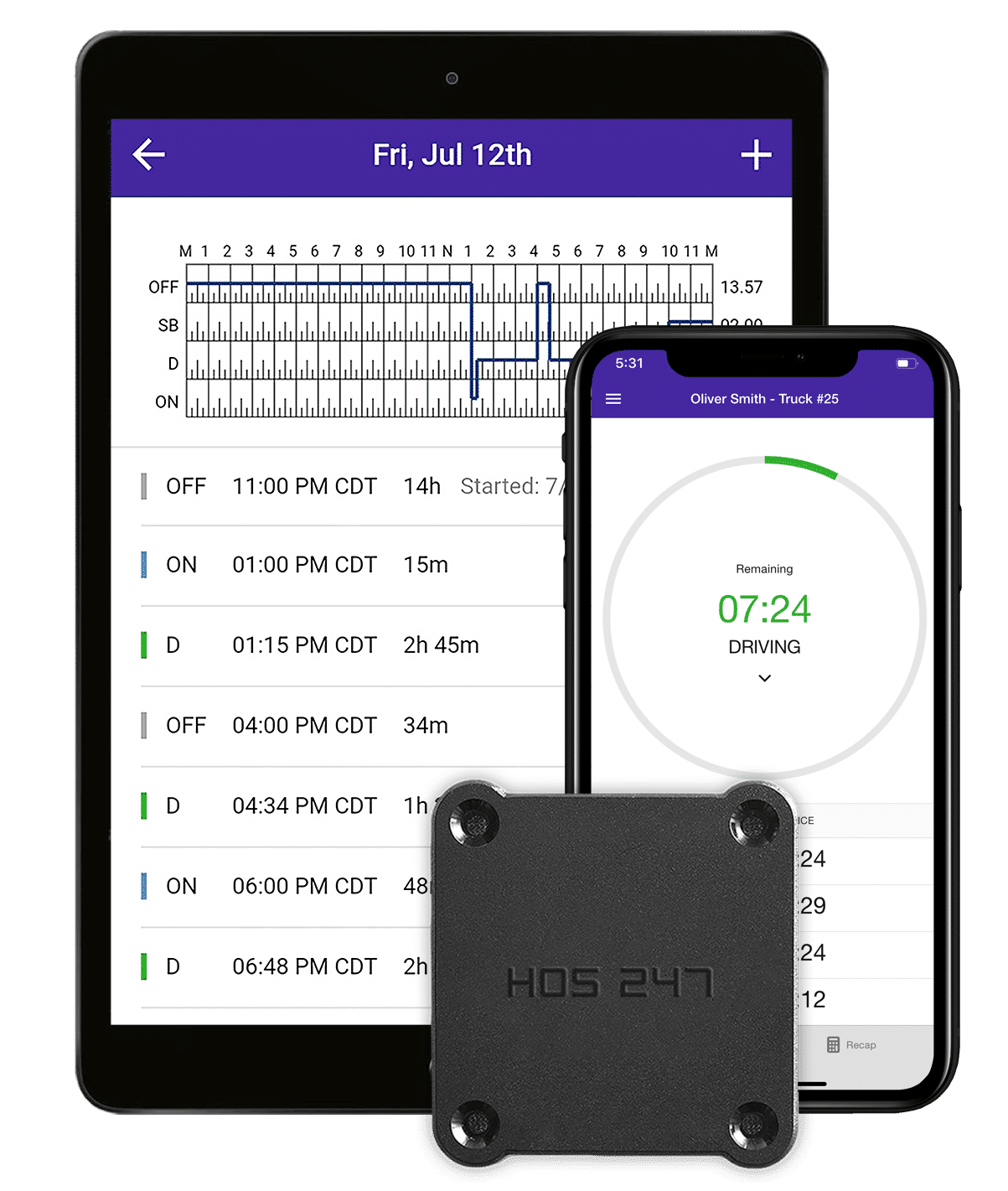Since the Department of Transportation’s ELD mandate came into effect, drivers of commercial vehicles have been required to use electronic logging devices to record hours of service. Choosing dependable DOT electronic log books can help carriers prevent ELD and HOS violations while increasing their operations’ efficiency by streamlining and optimizing workflows.
These systems synchronize with the truck’s engine to automatically record driving time and other information, such as engine hours, ignition status, location, and miles driven. ELD solutions help fleet managers stay updated on their drivers’ status and available driving hours, as well as vehicle location in real time, facilitating planning, supervision, dispatch and other management processes. In this article, we will discuss the details of the ELD law and help you find a reliable solution to stay compliant and improve profitability.
Do you have any questions? Talk to ELD Advisor: 650-405-3372 or Request Callback
Key DOT Electronic Log Book Regulations
DOT electronic log book regulations affect most operators of commercial vehicles who are required to prepare hours of service records of duty status: commercial truck drivers, commercial bus drivers, and owner-operators.To fully understand ELD compliance, let’s start with the key aspects of the mandate. The basic requirements of the law for DOT electronic log books are the following:
- Drivers not covered by a valid exemption (short-haul driver, RODS for 8 out of 30 days, drive-away-tow-away operations, or pre-2000 engines) must use an electronic logging system.
- To make sure ELDs fulfill performance and design standards, the mandate requires electronic logbooks to be certified by the provider and registered with the FMCSA.
- Supporting documents drivers must keep in cabin are:
-
- A user manual for the driver describing how to operate the ELD.
- An instruction sheet with step-by-step instructions to produce and transfer the driver’s hours-of-service records to an authorized safety official.
- An instruction sheet about ELD malfunction reporting requirements and recordkeeping procedures during ELD malfunctions.
- A supply of blank driver’s record of duty status (RODS) graph-grids sufficient to record the driver’s duty status and other related information for a minimum of 8 days.
Commercial vehicle drivers should strictly follow these requirements to avoid HOS- and elog-related fines and increased CSA scores. In addition to these basic rules established in the mandate, the FMCSA enforces regulations and exemptions regarding CMV operators’ hours of service. Read about them in the next section.
DOT Log Books for Truck Drivers Must Support HOS Rules and Exceptions
DOT electronic log book regulations aim to limit the amount of time commercial vehicle drivers are allowed to be behind the wheel and on duty to minimize the risk of driver fatigue. Here are three basic rules related to hours of service:
- The 14-hour rule means that drivers cannot drive after the 14th consecutive hour after coming on duty without taking 10 consecutive off-duty hours first. For passenger-carrying drivers no driving is allowed after 15 on-duty hours following 8 consecutive off-duty hours.
- The 11-hour rule refers to a maximum of 11 hours a property driver can drive after 10 consecutive hours off duty within a 14 hour timeline. For drivers of passenger vehicles the amount of driving hours is limited to 10 after 8 consecutive hours off-duty.
- The 30-minute rest break rule establishes that a property driver can’t drive for more than 8 cumulative hours without taking a break of 30 minutes. Performing non-driving on-duty tasks during that break is allowed.
However, there are certain situations in which commercial drivers can be temporarily exempt from HOS laws, meaning that they can legally extend the maximum limits. This is permitted under the following conditions:
- HOS exemption to 30-minute break rule applies to:
- Qualified short-distance drivers with a 150-mile provision.
- Qualified short-distance drivers who operate a non-CDL required vehicle with a 150-mile provision.
- 16-hour short-haul exception lets qualified drivers extend the 14-hour driving restriction to 16 once every 7 consecutive days if these specific requirements are met:
- The driver comes back to their work-reporting location and goes home at the end of their workday.
- The extension can be used only once a week unless the driver had the required 34-hour break since the last use.
- The adverse driving conditions provision expands the driving window by up to an additional 2 hours in case of adverse weather, road or traffic conditions as long as these were unforeseen.
- HOS rules can be temporarily suspended during federal or state declared emergency conditions.
DOT electronic log books rely heavily on the provider’s knowledgeability of all HOS and elog rules for compliance. It is important to note that not all electronic logbooks are equally reliable. The HOS247 ELD is FMCSA approved and has been extensively tested to meet all DOT requirements and supports current HOS rules and exceptions. In the following section, you will find out what characteristics have made our product a top choice among truckers.

HOS247 Is a Leading ELD Service Provider
The HOS247 solution stands out from other DOT electronic log books for its reliability and efficiency. Our ELD is designed to be accessible and easy to use to help operations run smoothly. It can be paired with both iOS and Android operating systems for driver convenience. The benefits of our customer-centered approach include:
- User-friendly interface. Drivers can easily manage their logs and create electronic driver vehicle inspection reports with a few taps on our app, while fleet managers can access and analyze this data through the intuitive web-based portal.
- Compatible hardware. The device is compatible with different types of trucks, so motor carriers won’t have to look for different providers for each vehicle class. HOS247 hardware can be set up in minutes and doesn’t require special installation.
- Top-rated technical support. Our dedicated technical support experts will assist you with installation, onboard training, troubleshooting, and any doubts related to compliance issues or the logbook’s use. The HOS247 customer support service is available seven days a week and our managers speak multiple languages apart from English, including Spanish and Russian.
- No-contract policy. At HOS247, we offer a flexible system of monthly or yearly subscriptions instead of long-term contracts, so our clients can change their plan or cancel their subscription if they so decide.
- Two-week trial. Customers can test the HOS247 solution for two weeks to get to know the system and see if it suits their business needs. If within these 14 days the client decides that our ELD doesn’t work for them, we will give them a full refund, no questions asked.
- Transparency. Many ELD companies are unclear about the cost of their DOT electronic log books. Offering cheaper solutions, they may have hidden fees for services that would normally be included in the package, such as installation expenses or user training. With HOS247, you may be sure our pricing is transparent. We offer a quality solution that is affordable and easy to use.
- Extra features. In addition to compliance monitoring, HOS247 offers other services to boost fleet operations’ productivity. Our ELD solution can be integrated with real-time GPS tracking, IFTA mileage, idle reporting, and vehicle diagnostics. If you want to know how these features can improve the quality of your company service and reduce operational costs, read the next section.
Do you have any questions? Talk to ELD Advisor: 650-405-3372 or Request Callback
ELD Extra Features to Help Your Business Thrive

An electronic logbook enhanced with additional features goes beyond compliance with the ELD law as it can help improve overall business performance. These are the essential tools that help carriers gain control over their processes and optimize operations:
- Real-time GPS. GPS tracking can provide full fleet visibility and increased security with advanced telematics technology. Fleet managers can monitor vehicles’ locations in real time, maximizing the productivity of operations. This tool also facilitates dispatch, allowing staff to plan routes more efficiently and avoid deadhead miles. Collected data also helps monitor, analyze, and improve monitor driver performance.
- IFTA mileage reporting. This feature automates complex IFTA state mileage calculations, reducing human error and helping companies file tax reports much faster and more efficiently.
- Vehicle maintenance. Tracking the timing for a vehicle’s scheduled maintenance is easy with this solution that automatically organizes preventive maintenance events based on mileage and hours of use, facilitating the job of keeping the vehicle “healthy.”
- Fault code detection. Fault codes help increase vehicle longevity and save on expensive repairs.When it detects malfunctions in the vehicle operation, it generates a trouble code and notifies the fleet manager. When equipped with telematics, the system can also send the alert directly to the maintenance department.
- Idle reporting. The solution offers customized reports for idling that leads to extra fuel expenses. Fleet managers can timely spot problems and reduce fuel wastage.
Better dispatch, improved customer service, reduced costs, increased productivity, and excellent compliance with road laws—all these goals are achievable with our solution. If you are wondering where to buy DOT log books by HOS247, contact us via phone or email, and request a demo.

As an expert in B2B and B2C sales, I’ve dedicated myself to perfecting sales processes and client retention strategies in the logistics and trucking industry. I have significantly contributed to the expansion of the ELD service, catering to retail and wholesale clients in need of HOS247 ELD solutions. My unwavering commitment to implementing state-of-the-art sales techniques and technologies ensures the continuous growth and success of businesses I work with.












Businesses in the transportation sector can benefit considerably from real time fleet tracking. Incorporating this technology gives managers full visibility of the fleet, reducing costs and boosting productivity. In this article, we will go through the main benefits of trackers

The FMCSA has developed a list for electronic logbook providers to register their logbook systems. Trucking professionals must choose from this ELD approved list. However, there are hundreds of options, so carriers should consider several factors before deciding which one

The Federal Motor Carrier Safety Administration (FMCSA) published updated hours of service (HOS) rules for commercial motor vehicle (CMV) drivers. All Electronic Logging Devices must be updated to comply with the new FMCSA HOS rule by September 29, 2020. Download
